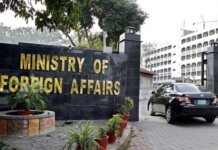Washington DC, 17 November 2022 (TDI): The Ambassador of Pakistan to the United States (US) Masood Khan met with the board of Directors of the Pakistan-American Chamber of Commerce (PACC) in Los Angeles on November 15, 2022.
During the meeting, he noted that “Pakistan is an ideal destination for US investors and businesses due to its unique geo-economic position and impressive demographic cohorts.”
Healthcare professionals and a group of businessmen from the textile, banking, logistics, solar, & Fintech sectors also attended the event. Speaking to participants, the Ambassador praised the Chamber’s efforts to advance US-Pakistan trade & investment.
He claimed that although trade between the two increased from US$ 8.5 to US$ 12 billion last year, there was still room for growth by fostering economic cooperation in key sectors.
This includes manufacturing, healthcare, agriculture, extractive industries, and oil and gas exploration sectors. The Ambassador further emphasized the importance of expanding business ties with California, whose GDP is US $3.5 trillion.
He claimed that California and Pakistan were significant trading partners. In this vein, Pakistan exported $457 million to California last year, while it imported only 138 million, creating a surplus of $319 million in Pakistan’s favor.
Although the total amount of trade between Pakistan and California was 600 million dollars, it needs to be increased due to the expansion of the IT and services sectors’ investment.
Also read: Ambassador highlights positive momentum between Pakistan & US
Ambassador Masood highlighted that Pakistan’s economy was undervalued and underestimated despite being a sizable market.
Along these lines, he claimed that 80 American businesses had been operating successfully and profitably in Pakistan for decades.
He urged the group to expand their businesses there and have faith in Pakistan’s economy because doing so would inspire foreign investment.
The also Ambassador acknowledged their concerns with regard to Pakistan’s regulatory frameworks but added that the Pakistani government had taken a number of measures to improve the ease of doing business.
These included implementing cyber laws, liberalizing the business visa system, enforcing intellectual property rights, and streamlining taxation. As a result, out of US$ 257 million in FDI from the US last year, US$ 203 million in profits were returned.
Numerous businesses, particularly those in the IT sector, were investing in Pakistan from countries like France, China, Germany, Singapore, South Korea, and Japan.
In addition, he also extended an invitation to Pakistani-American businesses to participate in Pakistan’s ongoing economic transformation. The Ambassador also urged the Chamber’s members to collaborate closely with the US.
International Finance Corporation (IFC) & International Development Finance Corporation (DFC) were making investments in Pakistani bankable projects, particularly in the alternative energy sector.
In this context, the Ambassador of Pakistan encouraged them to contribute to Pakistan’s post-flood rehabilitation. He recognized the significance of interaction with California-based think tanks.
In this context, he urged the participants to forge closer ties with these organizations and collaborate closely with them to advance improved Pak-US relations.
Fawad Ismail, the President of PACC, provided an overview of the group’s initiatives to strengthen commercial ties between Pakistan and the UU, including investment seminars and webinars on the Roshan Digital Account (RDA).
He also underlined the charitable work done by the Chamber, mainly during the Covid pandemic, including donations of over US$ 1 million in PPE, fund-raising for disasters in Pakistan & the US, & support for local communities and businesses during the pandemic.
I'm a detail-oriented, problem-solving, persistent multitasker. Having a magna cum laude MSc. in Strategic Studies from National Defense University, Pakistan, I believe in peaceful discourse & dialogue and have built my interest in nontraditional security threats.
I am an experienced writer with a primary focus on public policy, environmental security, nuclear strategy, and geopolitics!








